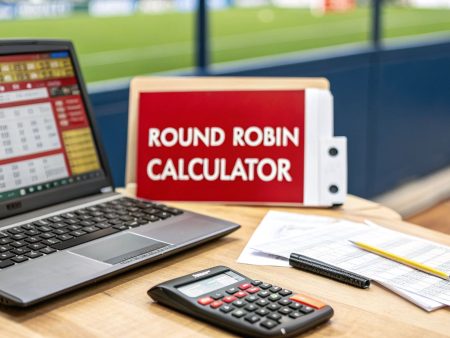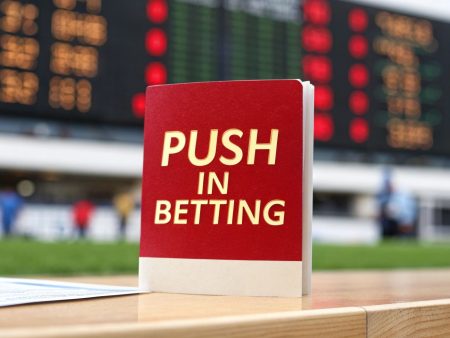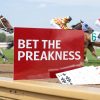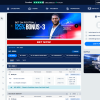If you want to consistently make money from sports betting, you need to stop thinking like a fan and start acting like an investor. It’s not about luck or gut feelings. It’s a disciplined, mathematical game where every move is calculated.
This means you need to make a fundamental shift in your mindset, stick to a strategy, and use the right tools for the job—specifically, offshore sportsbooks that offer better odds and more markets.
The Reality of Profitable Sports Betting
Forget the thrill of hitting a wild, longshot parlay. That’s not how you build a bankroll. Learning how to make money from sports betting is really about adopting the mindset of a financial trader. Every single wager you place has to be a calculated decision, driven by value, data, and rock-solid discipline.
Making that switch from a casual gambler to a strategic bettor is the single most important step. You stop betting on your favorite team just because they're your favorite team and start hunting for inefficiencies in the market. The real goal isn't just picking winners; it's finding bets where the odds are better than the actual probability of the outcome.
Shifting from Gambling to Investing
To really succeed, you have to treat your betting capital with the same respect you'd give a stock portfolio. That means taking emotion completely out of the equation and trusting your system. It's a tough mental hurdle to clear. If you want to dig deeper into this psychological side, our article on why sports betting is about more than just luck is a great place to start.
The global sports betting market is massive, valued at around USD 175.51 billion and on track to hit USD 354.89 billion by 2032. This boom is fueled by online platforms and better data, which creates even more opportunities for sharp, disciplined bettors to find an edge.
The core idea is simple: You're no longer paying for entertainment. You are capitalizing on market misjudgments. This is what separates the 5% of bettors who actually win from the 95% who consistently lose.
The infographic below breaks down the foundational process for building a profitable betting career. It all starts with the right mindset.
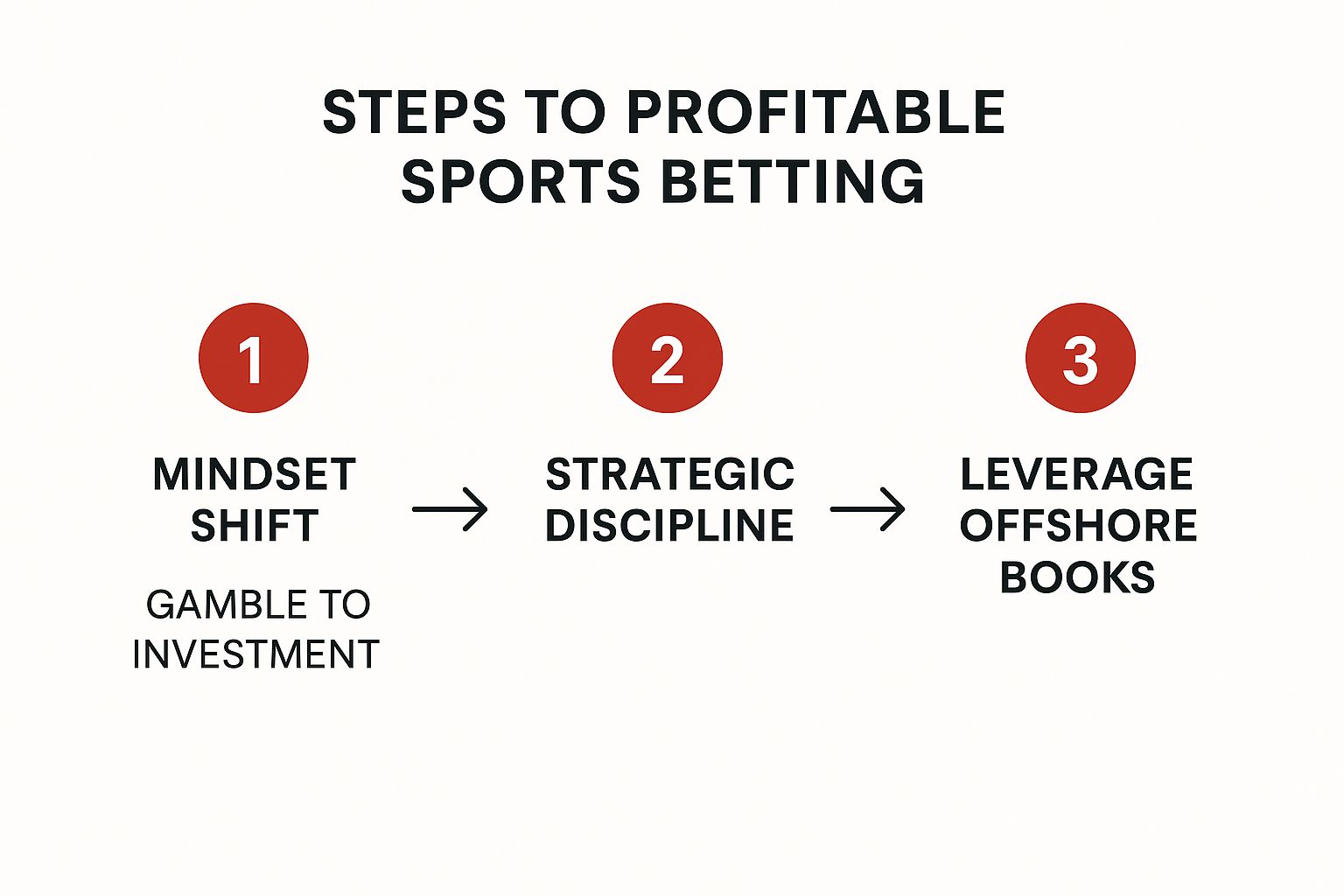
As the graphic shows, success starts with that mental adjustment. From there, it's all about disciplined execution and using the best tools available, which for serious bettors, means offshore books.
Before we dive deeper, it's helpful to see these core principles laid out. Think of these as the absolute non-negotiables for anyone serious about winning long-term.
Foundational Pillars of Profitable Betting
| Concept | Description | Why It's Crucial |
|---|---|---|
| Bankroll Management | Strictly defining your total betting capital and setting a fixed percentage (e.g., 1-2%) as your standard unit size for each wager. | Prevents you from going broke during a losing streak. It's the ultimate safety net and enforces discipline. |
| Finding Value (EV+) | Identifying wagers where the odds offered by the bookmaker are better than the true probability of an outcome occurring. | This is the only way to be profitable long-term. You're essentially buying a "stock" (a bet) for less than it's worth. |
| Data Analysis | Moving beyond basic stats to analyze advanced metrics, situational trends, and market sentiment to inform your betting decisions. | Gut feelings lose money. Data-driven decisions give you a repeatable, objective edge over the public and even the books. |
| Emotional Detachment | Making bets based solely on your strategy and data, completely ignoring personal biases, gut feelings, or recent wins/losses. | Emotion leads to chasing losses and deviating from your plan. A cold, calculated approach is essential for consistency. |
Mastering these four pillars is what separates the amateurs from the pros. It's not glamorous, but it's what works.
Why Offshore Sportsbooks Are Essential Tools
If you're serious about this, you need access to the best odds and the widest range of markets. That's where offshore sportsbooks come in.
Platforms like MyBookie, BetUS, BetOnline, and Bovada are indispensable tools for the sharp bettor. They consistently post their lines earlier and offer more competitive odds than many other books. A few cents of difference on the odds might not seem like much, but over hundreds or thousands of bets, it has a massive impact on your profit margin.
Throughout this guide, we're going to focus exclusively on how to use these platforms to your advantage, because they're the venues where professional and semi-pro bettors go to maximize their returns.
Mastering Your Bankroll for Long-Term Success

If there’s one non-negotiable rule in sports betting, it’s this: you have to master your bankroll. I get it, it's not the sexiest part of betting, but it's the absolute bedrock of long-term success. Seriously. Without it, even the sharpest bettors on the planet eventually go bust.
Think of your bankroll as your business's operating capital. It's a specific chunk of money you've set aside only for betting, and it has to be an amount you're totally comfortable losing. This discipline is what separates pros from casual gamblers who are just riding an emotional rollercoaster.
A solid bankroll strategy is what helps you survive the inevitable losing streaks—and trust me, they happen to everyone. It pulls emotion out of the equation and stops you from committing the single worst sin in betting: chasing losses with bigger, desperate wagers.
Defining Your Unit Size
First things first, you need to establish your unit size. This is just the standard amount you'll risk on any single bet, and it's always a percentage of your total bankroll.
Let's say you just deposited $1,000 into an account at an offshore site like BetOnline. The smart, conservative approach is to set your unit size somewhere between 1% and 2% of your total bankroll.
For that $1,000 bankroll, it looks like this:
- 1% Unit: Your standard bet is $10.
- 2% Unit: Your standard bet is $20.
I know, that sounds small. But it's a critical safety net. A brutal 10-bet losing streak (which is more common than you'd think) would only knock out 10% of your bankroll if you're using a 1% unit. You’d still have plenty of capital left to fight back. If you were betting 10% per game? You'd be wiped out.
The golden rule of bankroll management is simple but powerful: Never bet money you cannot afford to lose. Your betting funds should be entirely separate from your daily living expenses, savings, or investments.
This separation keeps your finances safe and lets you make clear-headed, analytical decisions instead of ones driven by stress. If this is all new to you, digging into a more detailed guide can help. Our post on sports betting bankroll management takes a much deeper dive into these strategies.
Flat Betting vs. Percentage Model
Once your unit is set, you need a staking plan. Two of the most effective and straightforward models are the flat-betting model and the percentage model. They both do one thing incredibly well: enforce discipline.
The flat-betting model is as simple as it gets. You bet the exact same amount—one unit—on every single wager. Doesn't matter how confident you are or if you're on a hot streak. If your unit is $10, every bet is $10. This is a fantastic method for beginners because it completely removes emotion and makes it dead simple to track your performance.
The percentage model is a bit more dynamic. Your unit size is always a fixed percentage (like 1%) of your current bankroll.
- Example: With a $1,000 bankroll, your first 1% bet is $10.
- If you win and your bankroll jumps to $1,020, your next 1% bet is now $10.20.
- If you lose and your bankroll dips to $980, your next 1% bet is $9.80.
This model has a built-in risk management system. It automatically increases your wagers when you're winning to press your advantage, and it shrinks them when you're losing to protect your capital.
Sticking to the Plan
Honestly, the hardest part of bankroll management isn't the math—it's having the discipline to stick with it day in and day out. After a huge win, the temptation to double your unit size is real. After a tough loss, that urge to win it all back with one massive bet can be overwhelming.
Resisting those impulses is what separates winning bettors from everyone else. It doesn't matter if you're placing bets on MyBookie, BUSR, or Xbet; the principles are universal. Your strategy, not your gut feeling, should be calling the shots. Track every bet, review your results, and trust the process. It's the only sustainable way to actually make money doing this.
How to Find True Value in Betting Odds
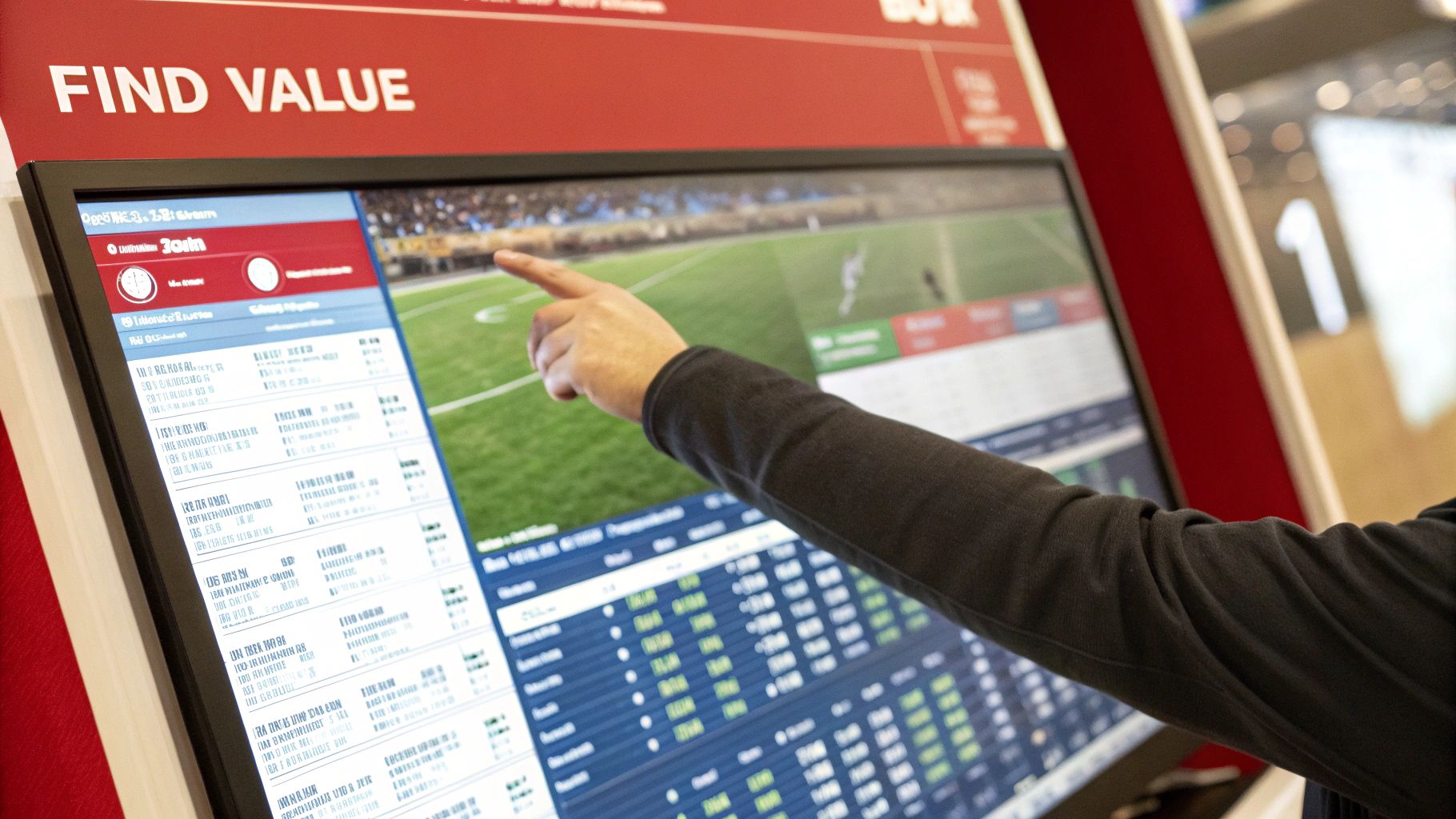
This is where the real work begins. Forget just trying to pick winners—that's a game for amateurs. Pros hunt for value, and it’s the single biggest principle separating strategic betting from just plain gambling.
Finding value simply means you’ve spotted a bet where the sportsbook's odds are better than the actual probability of that outcome happening.
You’re basically looking for a pricing mistake. Think of it like finding an undervalued stock. You buy it because your analysis says it’s worth more than its current price, not because you have some emotional attachment to the company. That’s exactly how you should be thinking on sites like Sportsbetting.ag and MyBookie.
Unlocking Implied Probability
Every set of odds has a probability baked right into it. We call this implied probability. It's the sportsbook's guess at how likely something is to happen, with their profit margin (the "vig") added on top. Your job is to calculate this number and decide if you agree.
For American odds, which you'll see most often, the math is pretty simple.
- For Underdogs (+ odds): Implied Probability = 100 / (Odds + 100)
- For Favorites (- odds): Implied Probability = Odds / (Odds + 100)
By turning odds into percentages, you take gut feelings out of the equation. You're no longer just guessing; you're comparing the book's price to what you believe is reality.
A Real-World Value Scenario
Let's put this into practice with a real game. Imagine you’re on Sportsbetting.ag checking out an NFL matchup.
The Miami Dolphins are taking on the Buffalo Bills, and the moneyline odds look like this:
- Miami Dolphins: +150
- Buffalo Bills: -170
Let's run the numbers for the underdog Dolphins at +150. Using our formula, the implied probability is: 100 / (150 + 100) = 40%. In other words, Sportsbetting.ag thinks the Dolphins have a 40% shot at winning this game.
This is where your own homework comes in. After digging into the matchup, you believe the Dolphins' true chance of winning is closer to 45%. Maybe the Bills' star quarterback is dealing with a minor injury, or you noticed the Dolphins' defense matches up perfectly against mobile QBs.
Because your assessment (45%) is higher than the sportsbook’s implied probability (40%), this bet has positive expected value (+EV). This is the kind of bet that builds a profitable bankroll over time.
A value bet isn't about finding a guaranteed winner. It's about consistently making wagers where the odds are in your favor, even if some of those individual bets lose. Over hundreds of bets, this mathematical edge is what generates profit.
Understanding and pouncing on these value spots is crucial. The sports betting market is growing like crazy, with user numbers projected to hit around 231.9 million worldwide by 2029. As the market gets bigger, the skill of finding value becomes even more powerful for serious bettors.
The Power of Line Shopping
Finding a good number on one sportsbook is a great start, but the real secret to maximizing your edge is line shopping. This is the simple act of comparing odds for the exact same bet across multiple sportsbooks. For anyone who actually wants to make money, this is completely non-negotiable.
A tiny difference in the odds might not seem like a big deal for one bet, but it compounds massively over the long run. A bettor who consistently gets +110 instead of +100 is going to be wildly more profitable.
This is exactly why you need accounts at several offshore sportsbooks. Get yourself set up and funded at a few key places like:
Before you lock in any wager, quickly check the odds at each site and place your bet where you get the most favorable line. This one habit alone can be the difference between a break-even player and a profitable one. To see just how much this can impact your bottom line, dive into our guide to sports betting odds comparison. Never settle for the first odds you see.
Find Your Edge by Developing a Betting Niche
Here’s a hard truth: the pros who actually make money betting on sports don't try to be experts on everything. Think about it. Sportsbooks like Bovada and Bookmaker.eu have to set lines for thousands of games across dozens of sports. They’re a mile wide and an inch deep.
Your biggest advantage is to be the complete opposite: an inch wide and a mile deep.
By laser-focusing on a specific niche, you can build a level of expertise that a generalist oddsmaker just can't compete with. This is where you find a real, sustainable edge. Forget about betting on the NFL one day and the NBA the next. Become a specialist. You’ll start to see nuances the broader market completely overlooks, and that’s the secret to spotting consistent value.
This doesn't have to be a major league like EPL soccer. It could be a much smaller pond, like a specific college basketball conference (say, the Big Sky). It could even be a particular type of bet, like NBA player props or first-half totals in college football. The more focused, the better.
Why Specialization Works
When you specialize, you begin to recognize patterns and details that simply aren't priced into the odds.
Let's take an ATP tennis specialist. They develop a deep, almost intuitive understanding of how certain players perform on different court surfaces—clay, grass, or hard court. A sportsbook might set a generic line for a match, but your knowledge might tell you that a particular underdog’s game is perfectly built for a slow clay court. Suddenly, their chances of winning are way better than the odds on a site like Cosmobet suggest.
That insight is your profit engine. You aren't just betting on a player; you're betting on your superior, focused knowledge.
The goal isn’t to know a little about every sport. It's to know more than the sportsbook about one specific area. This is how you flip the script and turn their broad coverage into a weakness you can exploit.
It also helps to understand where the money is flowing globally. The Asia-Pacific (APAC) region is the world's largest sports betting market, accounting for almost 47% of all wagers. This is driven by massive populations, rising incomes, and better internet access, which creates huge, liquid markets perfect for sharp analysis. If you're curious about these trends, you can explore detailed market analysis on sportsbettingdime.com.
How to Choose and Dominate Your Niche
Finding the right niche is a mix of genuine interest and strategic opportunity. You're going to be spending a lot of time on this, so you might as well pick something you actually enjoy following.
Here’s a quick guide to getting started:
- Start with what you like. What sports do you already watch religiously? Are there any leagues or teams you know better than the average fan? That's your starting point.
- Look for underserved markets. The NFL is a tough nut to crack because it's covered so intensely. Edges are razor-thin. Smaller college conferences or international leagues often have softer lines on sportsbooks like BetUS and MyBookie.
- Think about bet types. You could specialize in something as narrow as MLB player props—pitcher strikeouts or total bases for a specific hitter. This lets you focus your research on a very small, manageable set of data.
- Become a data master. Once you've picked your niche, dive in headfirst. Find reliable data sources, watch every game you can, and read everything available. Immerse yourself in the information.
For example, let’s say you pick NCAA basketball's West Coast Conference. Your job is now to go way beyond team records. You'll need to analyze coaching tendencies, specific player matchups, home-court advantages in those unique college gyms, and even how teams perform after long road trips.
This is the granular detail that helps you find value on sites like BetOnline or Xbet week in and week out, long before the rest of the market catches on. It’s a disciplined approach, for sure, but it’s the only one that truly works long-term.
Advanced Tactics and Common Pitfalls to Avoid

Once you've nailed down the basics, you can start digging into the more advanced strategies that seasoned bettors use to find an edge. This is where you can really exploit market inefficiencies across different sportsbooks.
But let's be clear: the most sophisticated tactic in the world is useless without discipline. Way more bettors go broke from simple, avoidable mistakes than from a lack of complex knowledge. Learning how to make money sports betting is a two-sided coin—it's just as much about playing defense as it is about playing offense.
Advanced Betting Concepts
Let's quickly touch on a couple of methods that sharps use to lock in a profit by taking advantage of conflicting odds from different books. Be warned, these require speed, precision, and accounts at multiple offshore sites to pull off.
- Arbitrage Betting: This is the holy grail for some bettors. It involves betting on every possible outcome of a game across different sportsbooks where the odds actually guarantee you a profit, no matter who wins. For example, you might see BetAnything offering +105 on the Lakers while Bet105 has the Celtics at +105 on the same moneyline. By betting on both, you've guaranteed yourself a small, completely risk-free profit.
- Middle Betting ("Middling"): This opportunity pops up when a point spread moves after you've placed a bet. Imagine you grab the Kansas City Chiefs at -6.5 on Xbet early in the week. By Friday, the line has shifted, and you see their opponent is now getting +8.5 on Bookmaker.eu. If you bet on the opponent at +8.5, you create a "middle." If the Chiefs win by exactly 7 or 8 points, you cash both tickets. You win one bet, push the other, or lose a tiny amount of juice in most other scenarios.
These strategies are powerful, but they demand constant line shopping and quick execution. This is exactly why any serious bettor will tell you that having accounts at multiple sportsbooks is non-negotiable.
The Critical 'Don'ts' of Sports Betting
Honestly, what you don't do is far more important than any fancy arbitrage play. The vast majority of bettors lose money because they fall into the same predictable, emotionally-driven traps. Your primary job is to sidestep them.
Don't Bet With Your Heart
This is the number one bankroll killer, period. You might love your hometown team, but the sportsbooks love them even more. Why? Because they know fans bet with loyalty, not logic.
Your personal bias completely clouds your judgment, making it impossible to see if a line has any real value. If you can't bring yourself to bet against your favorite team when the numbers scream that you should, then you need to make a hard rule: never bet on their games at all.
Don't Chase Your Losses
You just lost a bet you felt was a lock. That gut-wrenching feeling kicks in, and the immediate urge is to win it all back on the next game—usually by doubling down or making a reckless wager.
This is a catastrophic mistake. It demolishes every principle of proper bankroll management and is the fastest way to drain your account. Accept the loss, stick to your established unit size, and move on. There's always another game.
Don't Fall for Long-Shot Parlays
Ever wonder why sportsbooks like Bovada and Cosmobet plaster those massive parlay payouts all over their sites? It's because they are insanely profitable… for them.
The dream of turning $10 into $10,000 is a powerful lure, but the true odds of hitting a multi-leg parlay are astronomical. They're lottery tickets. While they can be a bit of fun for a tiny, recreational bet, they are a steady drain on any serious bettor's bankroll. Stick to straight, single bets where you can properly analyze your edge.
A disciplined bettor understands that long-term profit is built from grinding out small, consistent edges—not from hitting a once-in-a-lifetime parlay. Treat betting like an investment, not a trip to the casino.
The Absolute Necessity of Tracking Your Bets
If you aren't tracking every single wager you place, you aren't trying to make money. You're just gambling. Meticulous record-keeping is the only way to truly know if your strategies are working. It's how you find your strengths, expose your weaknesses, and calculate your actual return on investment (ROI).
Your tracking spreadsheet doesn't need to be complicated, but it has to be thorough. At a minimum, log this for every bet:
- Date of the wager
- Sportsbook used (e.g., Sportsbetting.ag, BetUS)
- Teams and sport
- Bet type (moneyline, spread, total)
- The odds you got
- Your stake (unit size)
- Result (win/loss)
- Profit or Loss
This data is your performance review. After a few hundred bets, you might discover you're crushing NBA totals but consistently bleeding money on NFL spreads. That information is pure gold. It tells you exactly where to focus your energy and capital. Without tracking, you’re just flying blind.
Answering Your Top Betting Questions
Even with a solid game plan, I find that new bettors always circle back to a few core questions. Getting straight, no-nonsense answers is key to setting yourself up for success and avoiding common pitfalls. Let's break down the big ones I hear all the time.
What Is a Realistic Profit Margin?
First things first: forget about doubling your money every other week. That's a pipe dream sold by scam artists and something you only hear from gamblers on a lucky streak that's about to end. In the real world of sharp, profitable sports betting, success is about grinding out a small, consistent edge.
The gold standard for a successful, long-term bettor is a return on investment (ROI) of 3-5%. I know, that number probably sounds low. But trust me, maintaining that over thousands of bets is incredibly difficult and the mark of a true pro. Think of it less like hitting the lottery and more like managing a high-performing investment fund.
Chasing some fantasy 20% or 30% ROI is the fastest way I’ve seen people blow up their bankrolls. It forces you to make terrible, high-risk bets that fly in the face of everything a winning strategy is built on. A steady 4% ROI means your system is working and you're beating the books.
To put that in perspective, if your total wagers for the year (your "handle") add up to $100,000, a 4% ROI is $4,000 in your pocket. This is a marathon, not a sprint.
How Many Offshore Sportsbook Accounts Do I Need?
The short answer? A lot more than one.
Seriously, if you're only using a single sportsbook like Bovada, you're making a massive mistake. It’s like only shopping at one grocery store and never checking the prices or sales at the others down the street. You're just leaving money on the table.
You need, at a bare minimum, 3-5 funded accounts at different offshore sportsbooks. This is the only way to effectively "line shop"—comparing odds on the same game across multiple books to lock in the best possible price. That tiny half-point or the difference between +110 and +115 might not seem like a big deal, but over hundreds of bets, it's what separates winners from losers.
I'd suggest a starting lineup that gives you plenty of options:
- MyBookie: Great for beginners with its clean interface.
- BetUS: Often has really competitive lines you won't find elsewhere.
- BetOnline: One of the best for posting lines early, which is a huge advantage.
- Bookmaker.eu: A classic book known for taking sharp action without batting an eye.
Having accounts at places like Sportsbetting.ag and Xbet as well means you can instantly grab the best number. That half a point you get by shopping around is often the difference between a win and a push.
Can I Make a Living from Sports Betting?
This is the million-dollar question, and it deserves an unfiltered answer. Yes, it's possible. But it's also extraordinarily difficult, and it's not a realistic path for 99% of bettors. The few people who pull it off don't treat it like a fun hobby; they treat it like a grueling, data-intensive full-time job.
Making a living from this game requires a few things that most people just don't have:
- A Massive Bankroll: You need serious capital to generate enough profit to live on. A 4% ROI on a $5,000 bankroll is just $200. But a 4% ROI on a $100,000 bankroll is $20,000.
- Iron-Clad Discipline: Can you handle a five-figure downswing without panicking and changing your entire strategy? Most can't. The emotional pressure is immense.
- A Full-Time Grind: The pros I know are putting in 40-60 hours a week. They're not just watching games; they're deep in spreadsheets, running models, shopping for lines, and analyzing data.
For most people, a much healthier and more achievable goal is to learn how to make money sports betting as a profitable side hustle. It's a fantastic way to generate a second income and engage with the sports you love on a much deeper level, all without the crushing pressure of needing it to pay your mortgage.
Here at USASportsbookList, our goal is to give you the tools and knowledge to bet smarter. From our in-depth reviews of the top offshore sportsbooks to expert strategy guides, we've got the resources you need to find your edge. Check out our curated lists and start your journey at https://usasportsbooklist.com.
